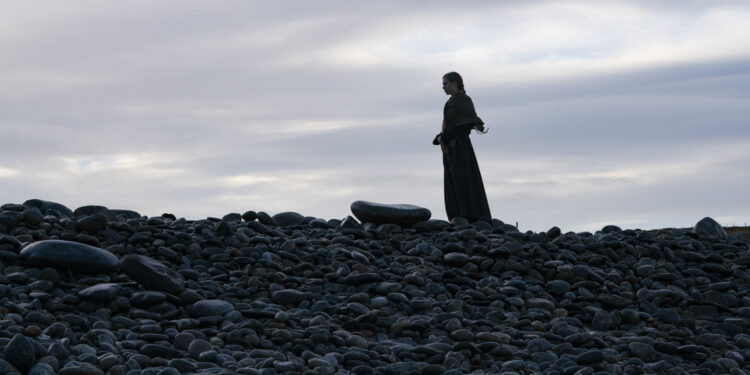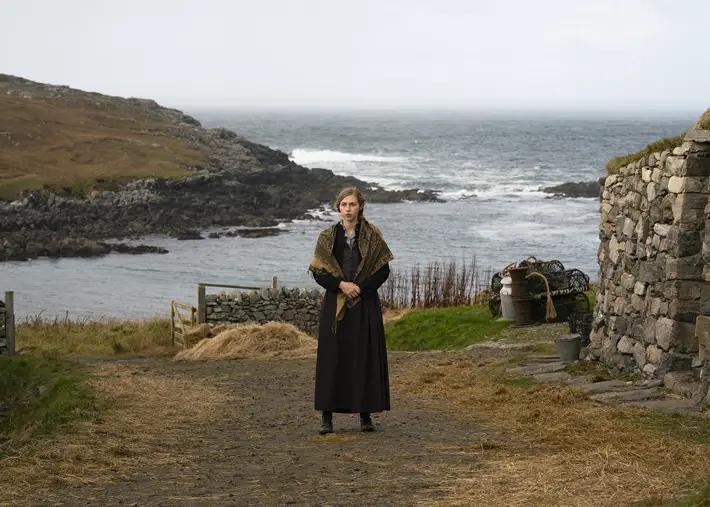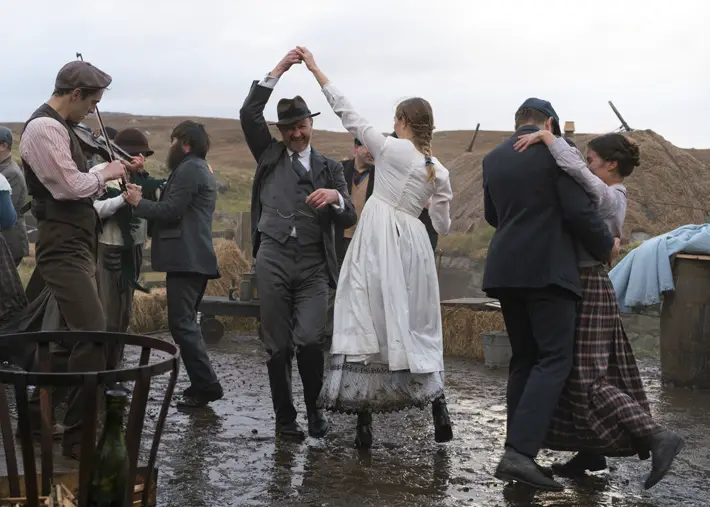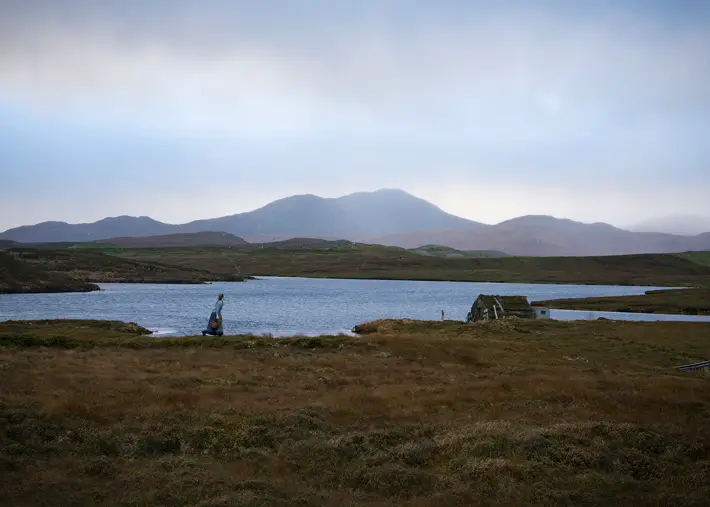The Road Dance (2021) – Film Review

Director: Richie Adams
Cast: Hermione Corfield, Will Fletcher, Mark Gatiss
Certificate: 15
By Elizabeth Stanforth-Sharpe
I read John MacKay’s novel, The Road Dance, when it was first published in 2002, and found it harrowingly sad, but beautifully written and descriptive of both the harshness and the closeness of Scottish island life at the turn of the twentieth century. As I read, I could feel the wind howling, the rain lashing down and the waves crashing against the rocks, every moment of grief, apprehension and panic, the shock of all that ensued and the behavioural conformity of the community rules that constrained individuals from telling the truth, fearful of the consequences. Each page turn pushed me more into the story and mesmerised me.
Richie Adams’ task in the film of The Road Dance was to bring that story, inspired by true events, to life in another media. The written word allows authors the freedom to get inside the heads of characters and to convey what they are thinking; it is not always an easy thing to translate the contents of a novel into a visual format where those unspoken thought processes and feelings must be communicated through the emotions and the script. I have a love-hate relationship with film adaptations; sometimes they work, sometimes they are appallingly bad, but always they must, by necessity, take occasional liberties with the original. The Road Dance is no different in that. Much of the complexity of the story is removed, but what has emerged is something that is beautiful to view, disturbing in its subject matter, respectful of the original and that carries weighty resonance in today’s Me-Too culture.
“Dreams are curtailed”
The Road Dance begins with a gorgeously idyllic scene of a cove on the Isle of Lewis, a painted fishing coble pulled up onto the shore, cliffs that both protect and threaten, and a lacy network of waves that edge the dark seas, as a child and her father swim and picnic together. This opening sequence sets the seal on a visual feast of stunning photography and a colour palette of deep teals, charcoal, slate and pebble greys, dark blues and lichen greens that carries through from beginning to end, the tonal variations reflecting points where oppression smothers or lifts.
The authenticity of filming on the island where events happened, adds so much. Weather conditions, short daylight hours, the quality of the light in that place, historical buildings, local people enlisted as extras, musicians from the area, and that extraordinary raw scenery, could not have been emulated anywhere else, and the production’s full investment in the Isle of Lewis shines through. Originally, this film premiered at The Edinburgh International Film Festival in 2021, and there is a deep sense of ‘rightness’ about that, as it is a Scottish film through and through, made during Covid on a relatively low budget, using smatterings of Gaelic, authentic Schottische routines, the practicalities of a crofting lifestyle, and referencing things that have their roots in that unique heritage – the road ceilidh (or dance) being the main one, but it’s general release gives it the wider audience it deserves.
The sixteen-year-old Kirsty Macleod, played beautifully by Hermione Corfield, is introduced to us as she helps to plant potatoes, a traditional crop of the island. Her mother Mairi (Morven Christie) reminds her, “Eyes up, Kirsty.” In those three words we discover the correct way to plant potatoes, but we are also alerted to the fact that Kirsty is a dreamer whose own eyes are constantly looking outwards, beyond the constraints of her tight-knit community. The tragedy is that as the story unfolds, her dreams are curtailed as her options disappear, and her ability to think bigger is diminished; her spirit crushed by the actions of someone else. The hope and possibility come in the knowledge that that community whose values and moral standpoints can be claustrophobic, damning and suffocating at times, also has the capacity to form a sustaining network of support and compassion when needed.
“Tenderness”
I don’t want to give too many spoilers, but the basic storyline is that Kirsty, a beautiful young woman, dreams of a life in America with her book-loving beau Murdo (Will Fletcher), a local lad that she has been courting in secret. Murdo is an optimist, nick named ‘Books’ by the other young people, who has brought in literature from overseas, loving to share poetry and fiction, frowned upon by the townsfolk, with Kirsty. Their hopes for a future together are squarely dashed when Murdo, along with all the young men of the town, is called up to follow the Universal Conscription to fight on the Western front in World War One. The community holds a road ceilidh to draw the families together and send their ‘boys’ on their way with positivity. Kirsty is given a virginal pure, white, some would say bridal, dress to wear, in a break from the colour coding of the piece. As soon as she pulls the garment over her head, it singles her out, and we are given that sinking feeling that by the time the dance is over, Kirsty will no longer be a virgin.
As events unravel, Kirsty’s life is changed forever, and the consequences of that evening have a far-reaching impact upon the life she has dreamed of.
The Road Dance is a film with so many dichotomies. The tenderness of the relationship between Kirsty and Murdo is in stark contrast to the film’s darker, bleaker second act. Mairi has been frozen by the grief of losing her husband, unable to relate in any meaningful way to her two daughters, and afraid to love again, but her melting and softening release in the most appalling times is a beautiful thing to watch. The incredible strength and capability of Lewis’ womenfolk, born to a life of grafting a living from the land, with babies strapped to their backs, stoically accepting the bad harvests along with the good, is set against the powerlessness of Kirsty’s situation. The wild, cold climate belies the warmth that lies in the heart of the community, and the isolated, quiet hermit, Skipper, becomes a gentle hero.
“Thread of connectivity”
If you are familiar with the book, you may find that the ‘twist’ is revealed too easily and too early. If you enjoy the costumes of The Outlander, this has similar vibes. If you like your films fast paced with lots of chaotic action, then The Road Dance is not your usual watch, but don’t dismiss it out of hand; a change of pace and genre may be just what you need right now. If you love seeing literature laced through your viewing, you will adore The Road Dance. If you want to provoke a discussion with young people about the issues involved, there is a whole workshop based around this film begging to be written. If you are someone who has been affected by sexual trauma, then I simply want to warn you that that is included, but to reassure you that the resolution of the film is overwhelmingly heartening.
There is so much that could be unpacked from this gorgeously put together film. Kirsty wears a silver cross given to her by her father. That necklace runs from beginning to end of The Road Dance as a thread of connectivity, of roads diverging, of love and loss, of trauma and healing, and of the value of community and support systems. We may live in a different era and in vastly differing circumstances, but that thread of connectivity is one we can all identify with. The sheer beauty of the landscape, the thought put into the production, the music, costumes, the capacity of the human spirit to move through adversities, and the joy of place and belonging, made it a winner for me.










